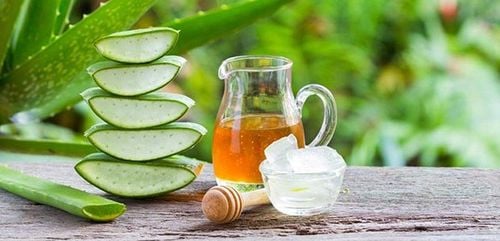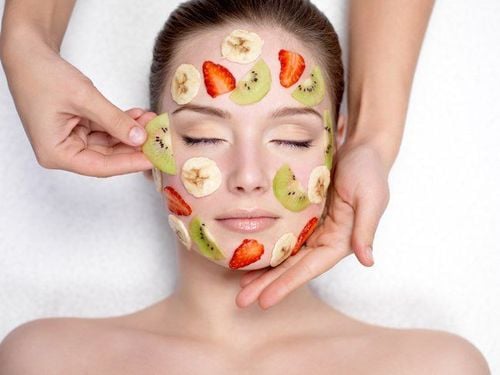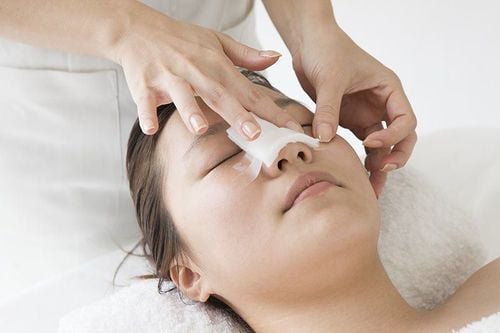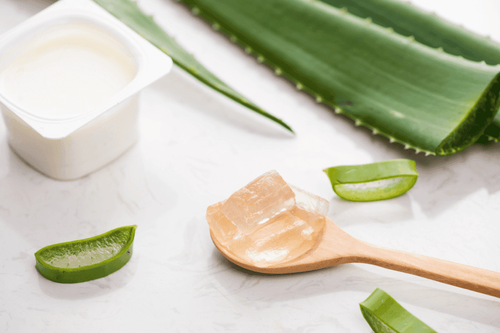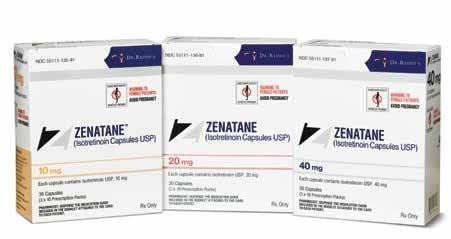This is an automatically translated article.
The effects of aloe vera are widely used in cosmetics and skin care products because of its antiviral and anti-bacterial properties. Besides, the aloe vera facial cleanser has the ability to effectively treat the skin because it can heal the wound caused by acne and soothe the skin. Basically, aloe vera is an all-rounder that everyone loves. Therefore, it is necessary to know if aloe vera is good for facial skin or what aloe vera extract has so that it can be applied to enjoy bright and blemish-free skin.
1. What is Aloe Vera Extract?
Aloe vera extract, also commonly known as aloe vera, has been used for centuries for its health, beauty, medicinal and skin care benefits. Aloe vera belongs to the cactus family, which is made up of three layers: the outer bark, the middle layer where the latex is produced, and the inner gel layer made up of 99.5% water. The remaining 0.5% of the inner layer is made up of 75 identified ingredients like zinc, potassium, magnesium and vitamins like vitamins E, C and D.
Aloe has a long history in medicine tradition, dating back 6,000 years to early Egypt, where the plant was depicted on rock carvings. In 1820, aloe was officially listed as a skin protectant by the United States Pharmacopoeia. In 2009, a systematic review reviewed 40 studies involving the use of aloe vera for dermatological purposes. Studies have also shown that aloe vera works for acne and can also be effective in helping to reduce the appearance of psoriasis, dermatitis, paresthesia, burns, and dermatitis. Accordingly, the most common application of aloe vera is to treat sunburn and minor burns thanks to its ability to help cool the skin and add moisture and essential vitamins to the skin.
2. What does aloe vera extract do for the skin?
2.1. Soothes and Cools Skin Aloe is used primarily to help soothe irritated or mildly damaged skin. This effect is due to the plant's ability to cool. With 99.5% water in aloe vera, this botanical helps to cool the skin and prevent heat from being trapped in the skin. This is great for heat-producing skin conditions or minor burns.
2.2. Provides moisture to the skin Aloe vera can help prevent the skin from losing water through the epidermis into the environment and the air, especially in dry environments such as heaters and air conditioners. The hypothesis for this effect of aloe is that it comes from glycosaminoglycans, a type of sugar molecule that helps bind moisture to the skin.
This ingredient is also found naturally in human skin with the main role of supporting the collagen and elastin proteins in the dermis. Collagen, elastin, and glycosaminoglycans form the bulk of an important support system known as the extracellular matrix. This system easily absorbs water, creating a liquid that fills the space between collagen and elastin fibers in the dermis, making it transparent. Therefore, the glycosaminoglycans found in aloe vera are what make this natural ingredient a great addition to skin moisturizers.
2.3. Helps Skin Heal Aloe Vera may also have anti-inflammatory benefits for the skin. These benefits brought by aloe vera are due to 75 valuable active ingredients, such as vitamins, minerals, enzymes, lipids, sugars, salicylic acid and amino acids. In fact, aloe provides 20 of the 22 essential amino acids for humans and 8 of the 8 essential amino acids.
The active ingredients found in this aloe vera have been extensively studied for benefits in dermatology. For example, aloe vera has strong anti-inflammatory properties due to an enzyme, bradykinase. By inhibiting the inflammatory mediators thromboxane B2 and prostaglandin F2, bradykinase helps reduce excessive inflammation when applied to the skin at the site of acne or other trauma, helping the skin to heal faster.
2.4. As an antioxidant for the skin Aloe vera leaf extract can protect the skin from the harmful effects of free radicals. Free radicals are generated when the skin experiences oxidative stress. The main cause of oxidative stress is exposure to UV rays. Free radicals then damage skin cells and are associated with accelerated aging.
When used, aloe vera can help reduce imbalances in free radical production caused by a molecule called aloin. Aloin can block up to 30% of ultraviolet rays when applied to the skin's surface. In addition, aloe vera is rich in vitamins C and E, which are powerful antioxidants that help protect the skin from the damaging effects of free radicals in the environment, such as exposure to UV rays, pollution and other harmful chemicals. chemical irritant. In addition, vitamin C also plays a role in the synthesis of collagen, the protein that gives the skin strength and durability. In addition, the beta carotene in the aloe plant, which is a precursor to vitamin A, also acts as an optimal antioxidant for the skin.
In short, what are the benefits of aloe vera extract that has been used for a long time. This botanical is known as an all-round, excellent moisturizer with healing and antioxidant properties for the skin. Users can comfortably use aloe vera extract morning and night to keep skin hydrated. In rare cases, aloe vera can also cause allergic reactions. Therefore, it is best for users to test products with these ingredients from reputable manufacturers instead of using them directly on the skin. Some types of aloe vera-based facial cleansers on the market today contain aloe vera extract to provide comprehensive skin care capabilities, from moisturizing the skin, unclogging pores, maintaining pH. Stabilizes the skin, to antibacterial effect, eliminates bacteria at the acne site, reduces the growth of acne and prevents new acne formation or also becomes a strong antioxidant, prevents the release of free radicals. due, regeneration of skin cells; thereby helping to balance moisture, maintain a naturally stable pH for the skin, and naturally smooth skin care.
Please dial HOTLINE for more information or register for an appointment HERE. Download MyVinmec app to make appointments faster and to manage your bookings easily.




